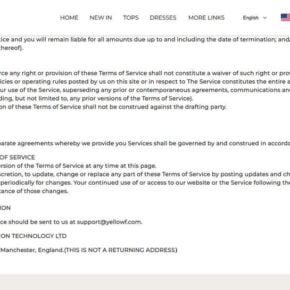Prolife Labs CBD Gummies have recently been promoted heavily across the internet through scam advertisements and fake celebrity endorsements. These ads portray famous celebs like Martha Stewart, Michael J. Fox and others raving about Prolife Labs CBD gummies for pain relief, reduced anxiety, improved sleep and more. However, these celebrity endorsements are completely fabricated.
- Overview of the Prolife Labs CBD Gummies Scam
- How the Prolife Labs CBD Gummies Scam Works
- What to Do If You Fell Victim to the Scam
- How to Identify Prolife Labs CBD Gummies Scams
- Tips to Avoid CBD Subscription Scams
- Reporting Prolife Labs CBD Gummies Scams
- FAQ About the Prolife Labs CBD Gummies Scam
- Conclusion
In reality, Prolife Labs CBD Gummies appear to be a subscription scam designed to enroll customers in expensive monthly recurring orders without clearly disclosing the terms upfront. Victims find unauthorized credit card charges from Prolife Labs CBD Gummies of $100 or more every month for product they only signed up to purchase one time.
This article will uncover the deceptive techniques used in the Prolife Labs CBD Gummies subscription scam so consumers can avoid falling into this trap. We will examine how the scam works to charge customers repeatedly through obscured ordering processes and refusal to cancel recurring shipments. Tips will also be provided to identify and halt unauthorized Prolife Labs CBD Gummies subscription billings if you fell victim already.

Overview of the Prolife Labs CBD Gummies Scam
The Prolife Labs CBD Gummies scam is defrauding countless consumers through deceptive marketing practices and hidden subscription traps. Scammers are heavily promoting Prolife Labs CBD Gummies online as a miracle solution for pain, anxiety, sleep issues and more using fabricated celebrity endorsements and false claims. When consumers purchase what they believe is a single order of Prolife Labs CBD Gummies, they are covertly signed up for expensive monthly recurring shipments they never agreed to.
Victims soon find excessive unauthorized charges from Prolife Labs CBD Gummies hitting their credit card statements every month. These unauthorized subscription fees can amount to over $100 per month without the buyer’s consent or knowledge of the auto-renewal agreement. Prolife Labs scammers bank on the obscure subscription terms going unnoticed until after the first month’s charges process.
Once consumers eventually notice the fraudulent charges and attempt to cancel the Prolife Labs CBD Gummies subscriptions, the scammers often ignore requests, making it extremely difficult to stop the billing. Cancellation attempts frequently get redirected in circles or completely stonewalled. Similarly, victims find it nearly impossible to get refunds for the unauthorized charges that already posted to their accounts.
Prolife Labs CBD Gummies scammers use bait-and-switch sales tactics, fake celebrity associations, buried subscription clauses enabling recurring billing, refusal to cancel orders, and denial of refunds in order to unlawfully take advantage of customers. This scam has cost countless victims hundreds or even thousands of dollars through forcibly recurring credit card charges for overpriced CBD gummies they never actually agreed to buy on an ongoing basis.
In summary, the Prolife Labs CBD Gummies scam operates on deception at every level, from the initial false ads to the intentionally obscured subscription enrollment process to the handling of cancellations and refunds. Only through quickly recognizing the scam’s red flags and taking decisive action against unauthorized charges can consumers avoid major financial damage from this CBD gummy subscription trap.
How the Prolife Labs CBD Gummies Scam Works
The Prolife Labs CBD Gummies scammers utilize a range of shady techniques to carry out their billing fraud:
Baiting With Fake Celebrity Endorsements
The scam starts with internet advertisements promoting Prolife Labs CBD Gummies as being endorsed by celebrities like Tom Brady for pain relief, Martha Stewart for reducing anxiety, and Michael J. Fox for improving sleep. But these celebrity endorsements are completely fabricated.
The fake ads use phrases like “Tom Brady Reveals the CBD Gummies That Help Him Manage Nagging Pain” or “Martha Stewart Shares How She Uses CBD Gummies to De-Stress and Sleep Better at Night.” Images are altered to make it appear the celebs are promoting Prolife Labs CBD Gummies.
Driving Traffic to Sales Pages
Clicking on these deceptive ads leads to sales pages with more false testimonials. These pages downplay that they will enroll buyers in expensive recurring subscription plans. “Limited-time offers” create urgency to purchase immediately.
Charging Credit Card for Initial Order
To complete a purchase, customers must enter credit card information. The initial charge is typically $39.95 or $49.95. But hidden fees tack on more to this charge, already higher than advertised.
Enrolling Victims in Monthly Subscriptions
This is the key to the scam. Without clearly explaining terms, ordering instantly signs up customers for costly monthly Prolife Labs CBD Gummies subscriptions. Victims find recurring charges of $90 – $150 billed to their credit cards without consent.
The obscure auto-renewal is buried in fine print or designed to be overlooked during checkout. Many victims miss it entirely until the second month’s charge arrives.
Ignoring Cancellation Attempts
When consumers eventually notice the unauthorized charges and try to halt the subscriptions, Prolife Labs CBD Gummies scammers often ignore emails and phone calls requesting to cancel. They make it extremely difficult to stop the billing.
Refusing Refunds
Even after a victim manages to cancel the unauthorized subscription, Prolife Labs CBD Gummies scammers typically deny refund requests. They invent reasons like “no refunds on used products” to avoid returning the fraudulent charges.
In summary, the Prolife Labs CBD Gummies scam uses bait-and-switch tricks, celebrity deception, hidden ordering terms, and refusal to cancel subscriptions or refund charges. Being aware of these tactics is key to avoiding being scammed.
What to Do If You Fell Victim to the Scam
If you discover you were signed up for monthly Prolife Labs CBD Gummies orders without your agreement, take the following steps:
Notify Your Credit Card Company
Contact your credit card provider immediately and explain you are the victim of an unauthorized CBD subscription scam. Request they block any additional recurring charges. Under consumer protection laws, customers cannot be forced into renewals without consent.
Cancel Any Active Subscriptions
Call and email Prolife Labs CBD Gummies customer service demanding to cancel the subscriptions and any future billing or shipments. Get written confirmation if possible and follow up if further charges still occur.
Dispute All Unauthorized Charges
Review statements and dispute every Prolife Labs CBD Gummies charge made without your authorization. Explain to your credit card company that you were signed up for recurring charges without consent. Supply any applicable evidence.
Reject Partial Refund Offers
Do not accept any excuses to avoid refunding unauthorized subscription billings in full. Threaten further fraud reporting if needed until your credit card company reverses all related charges. Beware refund runarounds.
Report the Scam
File a scam report about Prolife Labs CBD Gummies with the FTC, BBB, and other applicable review sites detailing the deceptive ads,hidden terms, billing fraud and refusal to refund. Prevent others from being scammed too.
Quick action is key to limiting financial loss from the Prolife Labs CBD Gummies unauthorized subscription scam. Persist until any ongoing billing is canceled and lost money recovered.
How to Identify Prolife Labs CBD Gummies Scams
Consumers can protect themselves by watching for these common red flags of Prolife Labs CBD Gummies scams:
Celebrity Endorsements That Don’t Add Up
Be very suspicious of ads claiming famous celebs recommend Prolife Labs CBD Gummies. Verify any celebrity endorsement using objective sources before believing it.
Aggressive Sales Tactics
Ads or websites pushing Prolife Labs CBD Gummies through countdown timers, limited-time discounts or other high-pressure tactics should raise skepticism. Scammers manufacture fake urgency.
Prefilling Order Forms
Watch out for pre-checked subscription boxes or other prefilled order details that authorize recurring charges by default. This obscures the unwanted subscription agreement.
No Reviews
Lack of objective reviews on the Prolife Labs website or third-party review sites indicates a likely scam. Genuine CBD companies have reviews from real customers.
No CBD Details on Products
If the gummies arrive but lack any mention of CBD, ingredients or dosing on the actual packaging, you were likely misled by scammy ads and websites.
Being alert to these types of red flags can prevent consumers from falling victim to Prolife Labs CBD Gummies scams exploiting subscriptions and recurring billing. Make sure to research before buying.
Tips to Avoid CBD Subscription Scams
In addition to watching for the specific hallmarks of Prolife Labs CBD Gummies scams, consumers can protect themselves by following these general tips:
- Verify celebrity or influencer endorsements through independent research before believing claims.
- Stick with reputable CBD companies and avoid any offering subscriptions or recurring orders.
- Read all fine print on websites carefully for monthly billing, auto-renewal, or subscription disclaimers that enroll you in recurring shipments.
- Monitor bank and credit card statements routinely to identify any unauthorized subscription charges right away.
- Only provide payment information through secure websites, never via an ad pop-up, email link or text.
With scrutiny of sellers, avoidance of recurring orders, and reviewing website fine print, consumers can steer clear of shady CBD subscription scams trying to unlawfully bill them repeatedly, like the Prolife Labs CBD Gummies scam.
Reporting Prolife Labs CBD Gummies Scams
If you get caught up in a Prolife Labs CBD Gummies scam through deceptive ads, hidden subscription clauses, or recurring credit card charges, make sure to report it:
- Better Business Bureau – File a report about the deceptive practices.
- Federal Trade Commission – Report the Prolife Labs CBD Gummies scam to the FTC.
- State Attorney General – Contact your state AG’s consumer protection department to report the fraud.
- Credit Card Company – Call your credit card provider’s fraud department for charge dispute assistance.
- Review Sites – Leave online reviews detailing the Prolife Labs CBD Gummies scam to warn others.
The more victims who speak out, the better the chances these criminal CBD subscription scammers can be held accountable and prevented from harming additional innocent customers.
FAQ About the Prolife Labs CBD Gummies Scam
What is the Prolife Labs CBD Gummies scam?
The Prolife Labs CBD Gummies scam signs people up for expensive recurring credit card charges without consent. It uses fake celebrity endorsements and obscures that orders enroll customers in monthly subscriptions.
How does the scam work?
Fake ads convince targets to buy Prolife Labs CBD Gummies. But the order covertly signs them up for costly monthly shipments they’re unaware of until the charges start hitting their credit card.
Are the celebrity endorsements real?
No. Celebrities like Tom Brady and Martha Stewart have not endorsed Prolife Labs CBD Gummies despite the fake ads’ claims. The celebrity endorsements are fabricated.
What are victims charged monthly?
Unauthorized monthly subscription fees typically total $90 to $150 per month. Many victims are charged hundreds before discovering the scam.
How can you cancel the subscriptions?
Call customer service and your credit card company to halt further billing. Get written confirmation of the cancellation from Prolife Labs. Follow up on any ongoing charges.
Can victims get refunds for unauthorized charges?
Yes, contact your credit card company to dispute all unauthorized subscription fees and request chargebacks. Do not accept only partial refunds.
Should this scam be reported?
Yes, file detailed scam reports with the FTC, state AGs, BBB, and in online reviews to help expose these criminal scammers.
Conclusion
Prolife Labs CBD Gummies scammers have been deceiving consumers through fake celebrity endorsements, exaggerated health claims, concealed subscription traps, and denying refunds for unauthorized credit card charges. Customers lured in by the deceptive ads end up losing large sums of money through recurring billing they never agreed to.
Hopefully this guide will help prevent consumers from being duped by the shady subscription scam tactics used to promote Prolife Labs CBD Gummies online. Apply caution when encountering CBD gummy ads, scrutinizing seller legitimacy and watching for fine print enrollment in recurring shipments or billing. Those already victimized by the Prolife Labs CBD Gummies scam through unauthorized billing must act quickly to halt the unwanted charges and recover lost funds through their credit card provider. Please share this article to help protect others from CBD subscription scams!




